Revisiting big-screen Liberation War classics

The Liberation War, while emblematic of unparalleled heroism, is equally a tale of immense loss and suffering. Over the years, filmmakers have explored various aspects of this historic conflict through the medium of cinema. Let us revisit some of the most notable films that captured the essence of this epochal event.
'Ora Egaro Jon'
The first film about Bangladesh's Liberation War, "Ora Egaro Jon," holds a special place in the nation's cinematic history. Directed by the legendary Chashi Nazrul Islam, the movie received accolades at the inaugural Bangladesh National Film Awards for its monumental depiction of the War.
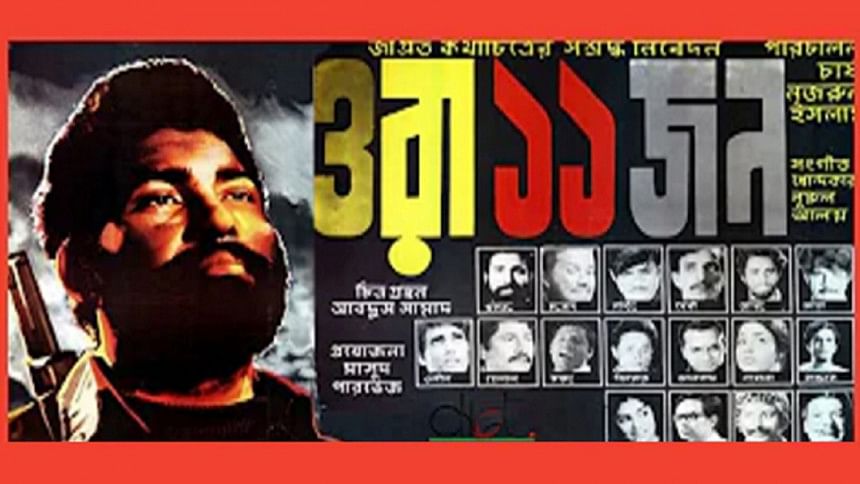
The story follows Khasru and his sister Mita (played by Shabana), who live in Dhaka with their uncle for their studies. Khasru is engaged to their neighbour Sheela (Nuton), while Mita, a medical student, is romantically involved with Sheela's brother Parvez (Razzak). Their tranquil lives are upended when the war begins.
Khasru joins the War and forms a guerrilla unit with 10 others under his command. Meanwhile, Parvez is captured and tortured by the Pakistani military for aiding the freedom fighters. Unable to extract information, the soldiers execute his mother and younger brother. Sheela endures unspeakable atrocities, while Mita, who had joined a medical team in Bikrampur, also falls victim to the military's brutality.
The film culminates with the victory of the freedom fighters, though many return home to find their families destroyed or permanently absent. With the cooperation of Major Ziaur Rahman, a prominent sector commander, "Ora Egaro Jon" used authentic weapons and ammunition from the Liberation War. A memorable scene depicting the execution of a captured Pakistani soldier was enacted with the help of real-life prisoners of War, highlighting the film's commitment to realism. This cinematic masterpiece remains a poignant portrayal of the war's sacrifices and the resilience of the Bangladeshi people.
'Arunodoyer Agnishakhi'
"Arunodoyer Agnishakhi," directed by Subhash Dutta, was the second film in independent Bangladesh to centre on the Liberation War. Known for his innovative poster designs and celebrated for his direction of "Mukh O Mukhosh," Dutta crafted a stirring film that addressed the plight of war survivors, particularly women who faced sexual violence. The poster carried a heart-wrenching message: "Restore the dignity of violated women!"
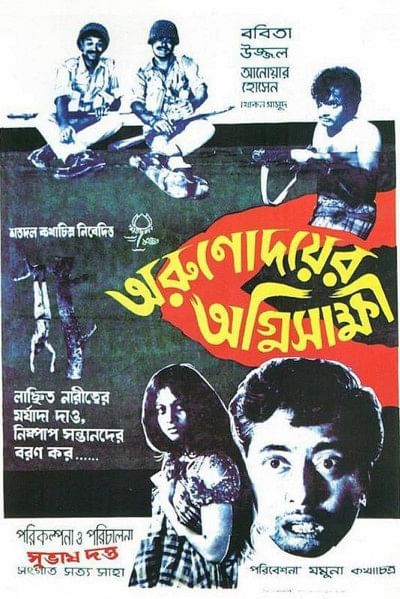
The plot begins in early 1971 with a film crew arriving in a village to shoot a movie. Among them is an actor, famous for his portrayal of Sirajuddaula, who becomes acquainted with villagers Asad, Romana, and Badruddin. A love triangle develops: Romana is romantically involved with Asad, while Badruddin harbours unrequited feelings for her.
The village faces devastation during the night of March 25, 1971. Romana's family is killed, and she becomes a victim of violence. The actor escapes to Kolkata, where he grapples with survivor's guilt and eventually resolves to join the Liberation War. However, his fear of death holds him back.
Meanwhile, Asad dies trying to rescue Romana, and Badruddin also loses his life in the effort. Pregnant and devastated, Romana contemplates suicide but chooses to live for the sake of her siblings. After the War, the actor returns and advocates for the recognition of War children and the valour of the Biranganas. Featuring stellar performances by Ujjal, Babita, and Anowar Hossen, this film remains a powerful exploration of war's human cost.
'Abar Tora Manush Ho'
Among the most discussed post-independence Liberation War films is "Abar Tora Manush Ho," released on December 7, 1973. Directed by Khan Ataur Rahman, the film portrays the struggles of seven freedom fighters who return from the war, only to confront the corruption and moral decay plaguing post-independence society.
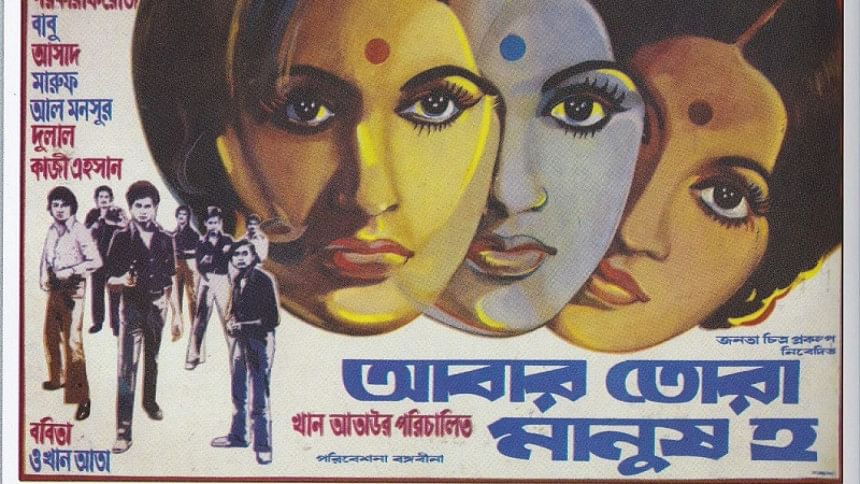
Armed with weapons they refuse to surrender, the fighters take matters into their own hands, combating vices like black marketeering and exploitation. Khan Ataur Rahman plays the principal of Bangobani College, with the seven fighters as his students.
The film's soundtrack includes the iconic songs "Ek Nodi Rokto Periye" by Shahnaz Rahmatullah and "Tumi Cheyechile Ogo Jante" by Abida Sultana, both written and composed by Khan Ataur Rahman. While the film sparked controversy, with some accusing Rahman of undermining the war's sanctity, it remains an enduring commentary on the societal challenges that followed independence.
'Megher Onek Rong'
Released in 1976, "Megher Onek Rong" was Bangladesh's second colour film and the first to depict the Liberation War in vibrant hues. Directed by Harunur Rashid, it challenged the male-centric narratives of victory and focused on the harrowing sacrifices of women.
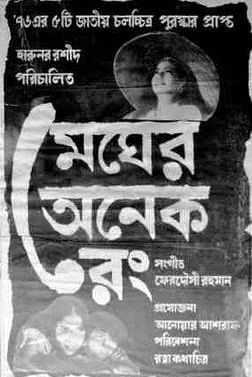
The story follows Dr Omar, his wife Ruma, and their child Adnan as their lives are shattered by the Pakistani military. Ruma endures unimaginable suffering, while Omar, consumed by grief, withdraws emotionally. Ruma ultimately takes her own life, leaving Adnan to be raised by his grandfather.
Though the film did not achieve commercial success, it was critically acclaimed for its technical brilliance and artistic depth. It remains a landmark in Liberation War cinema, offering a rare perspective on women's experiences during the conflict.
'Aguner Poroshmoni'
Based on Humayun Ahmed's novel, "Aguner Poroshmoni" unfolds in Dhaka in July 1971. It tells the story of Badiul Alam, a freedom fighter leading a guerrilla operation, and his interactions with Matin's family, particularly his daughter Ratri.
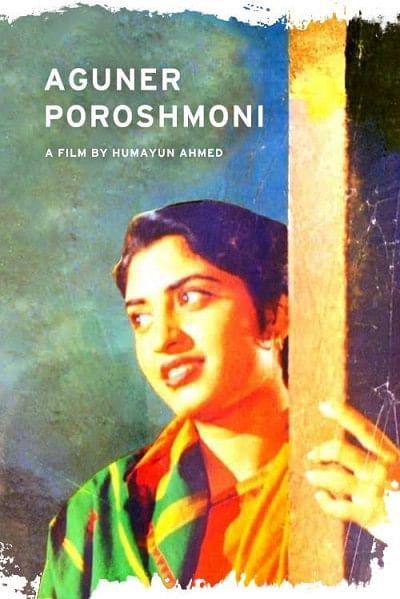
As Badi's mission unfolds, the war's violence intrudes on their lives, culminating in a devastating loss. The film juxtaposes the personal struggles of its characters with the broader war effort, capturing both the heroism and tragedy of the time.
Released on December 16, 1994, "Aguner Poroshmoni" won the National Film Award for its compelling storytelling, exceptional performances, and iconic soundtrack. Directed by Humayun Ahmed, it remains a cinematic milestone in portraying the Liberation War.

 For all latest news, follow The Daily Star's Google News channel.
For all latest news, follow The Daily Star's Google News channel. 






Comments